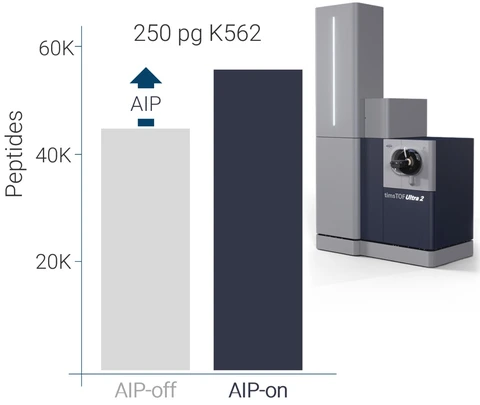
Bruker Enhances Single-Cell Proteomics and Immunopeptidomics with New Software at US HUPO
At the 21st Annual US HUPO Conference, Bruker Corporation (Nasdaq: BRKR) unveiled significant advancements in 4D-Proteomics™ performance, along with new software and applications aimed at providing deeper biological insights.
Bruker Corporation (Nasdaq: BRKR) has made major strides in the field of proteomics and mass spectrometry, introducing multiple innovative technologies aimed at enhancing biological research. These advancements were showcased at the 21st Annual US HUPO Conference, with the company highlighting new systems and software designed to improve peptide and protein identification, streamline workflows, and provide deeper insights into complex biological systems.
A. AIP on timsTOF Ultra 2: Enhanced Performance for Single-Cell Proteomics and Immunopeptidomics
A major development in Bruker’s proteomics offerings is the introduction of the new Advanced Ion Path (AIP) for the timsTOF Ultra 2 mass spectrometer. This technology enables more efficient ion transfer from the collision cell to the orthogonal acceleration region of the time-of-flight (TOF) analyzer.
With relevance to single-cell proteomics (SCP), the AIP demonstrates impressive improvements, offering over a 15% increase in protein identification and more than a 20% increase in peptide identification, especially for smaller sample amounts like 250 pg. These improvements ensure higher sequence coverage, an essential factor in achieving more reliable biological insights. The application of AIP extends to immunopeptidomics as well, where similar performance boosts are seen. Bruker expects to officially launch the AIP on the timsTOF Ultra 2 system at ASMS 2025, with the added benefit of field upgradability for current systems.

B. DeutEx Software: Revolutionizing Hydrogen-Deuterium Exchange (HDX) Mass Spectrometry
Another key announcement was the integration of DeutEx software into Bruker’s proteomics ecosystem. Developed by Dr. Petr Novák from the Czech Academy of Sciences, DeutEx is designed to support hydrogen-deuterium exchange mass spectrometry (HDX-MS) analysis. HDX-MS is a powerful technique used to study protein dynamics and structure by tracking the exchange of hydrogen atoms with deuterium in a protein’s backbone.
By incorporating DeutEx into its platform, Bruker is enabling more comprehensive structural and dynamic analyses of proteins and protein complexes. Dr. Novák commented, “With support and further development by Bruker, DeutEx will become widely used to enhance the study of structural and dynamic properties of proteins, providing insights for biopharma research and structural biology.”
C. OmniScape 2025b: Advancing Top-Down Proteomics
The release of OmniScape 2025b software marks another milestone in Bruker’s continuous efforts to advance top-down proteomics. This new version brings a tenfold increase in de novo sequencing performance, improving the detection of truncated protein variants and providing more comprehensive sequence annotations. The update also allows for the integration of sequence maps derived from multiple MSn levels, including MS2 and MS3, as well as MALDI T³-sequencing.
OmniScape is widely recognized for its powerful capabilities in analyzing top-down mass spectrometry data, and experts like Professor Julia Chamot-Rooke from the Institute Pasteur in Paris have praised it as one of the most advanced tools for analyzing protein spectra. Professor Francisco Alberto Fernandez-Lima from Florida International University noted that OmniScape’s user-friendly interface and interactive features make it particularly useful for validating protein sequences and post-translational modifications (PTMs) across various fragmentation techniques.
D. Enhanced ProteoScape and GlycoScape Software for Glycoproteomics
Bruker also introduced updates to its ProteoScape platform, including enhanced versions of Spectronaut and GlycoScape software. ProteoScape V.2025c includes updates to Spectronaut v.19.6, which improves quantification and PTM stoichiometry calculations. GlycoScape v.2025c, which is focused on glycoproteomics, now offers custom modifications, including a choice of glycan building blocks and labeled glycans.
These updates provide significant improvements in the identification of glycopeptides, increasing the number identified by six to ten times. When used in combination with the Agilent AssayMAP Bravo® for automated, high-throughput glyco-insights, these tools allow for comprehensive glycoform profiling on timsTOF systems. Dr. Christopher Adams, Director of Proteomics at Rezo Therapeutics, commented on the impressive speed and capability of the platform, especially in high-throughput settings.
E. TwinScape: Cloud-Based AI for Proteomics Quality Monitoring
Bruker has introduced TwinScape, a cloud-based, AI-enabled software solution designed to monitor the quality of mass spectrometry systems. TwinScape is already in use with a wide range of customer systems, including nanoElute® LCs and the entire timsTOF series. The system provides continuous quality control insights, ensuring that any potential issues can be addressed before they impact research. Dr. Julian Langer from the Max Planck Institute of Biophysics and Brain Research shared his positive experience with TwinScape, highlighting its ability to monitor HeLa/iRT-based quality control pipelines and improve workflow efficiency by offering real-time data and proactive technical support.
About Bruker Corporation
Bruker Corporation is a global leader in high-performance scientific instruments and analytical solutions, enabling breakthrough discoveries in post-genomic research. With a wide portfolio of systems used in proteomics, genomics, cell biology, and biopharma applications, Bruker’s solutions are integral to advancing life science research, clinical diagnostics, and industrial applications. Through continuous innovation and close collaboration with customers, Bruker continues to drive progress in understanding molecular, cellular, and structural biology, making significant contributions to improving human health and advancing scientific knowledge across multiple domains.
These new advancements from Bruker demonstrate the company’s commitment to enhancing proteomics and mass spectrometry workflows, offering powerful tools that provide deeper biological insights and improve research capabilities across diverse scientific fields.




